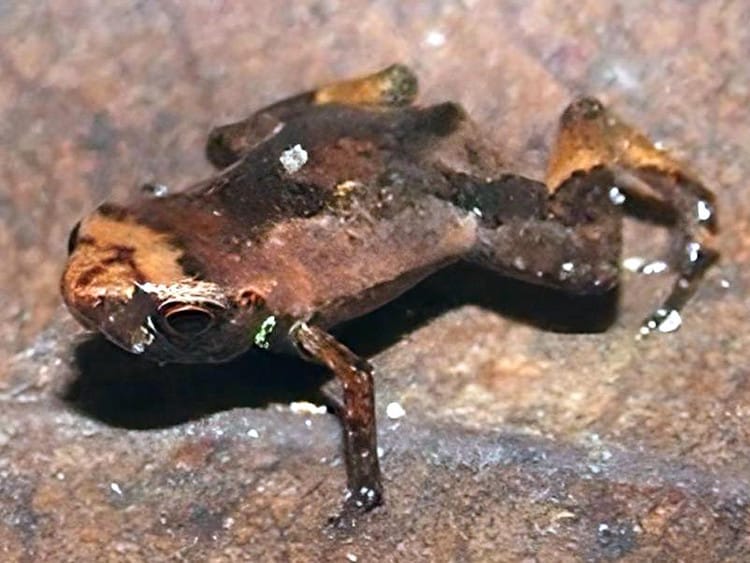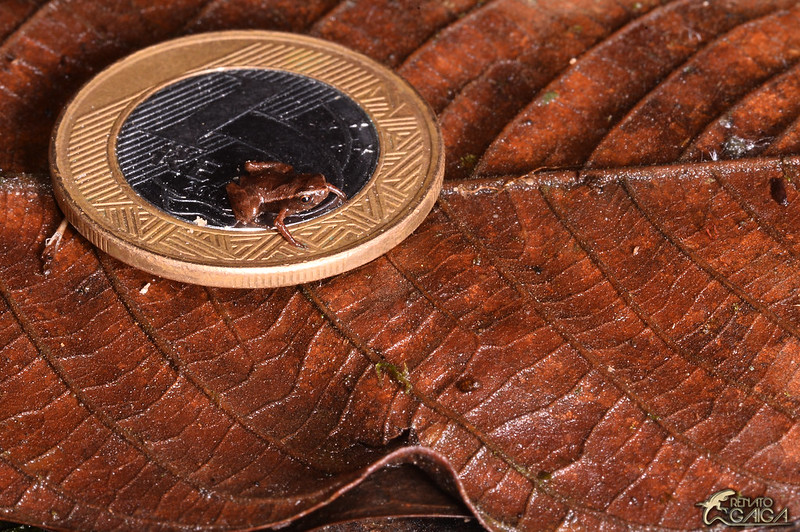Can you picture an animal small enough to comfortably sit atop your fingernail? It may sound like work of fiction, but such an animal actually exists—the Brazilian flea toad. Don’t be fooled by the name though. It is neither a flea nor a toad, but, in fact, a frog. Due to its size, it is believed to be the smallest amphibian and smallest vertebrate in the world. And while scientists have known about it for over a decade, they were only able to throughly measure the species recently. In February 2024, researchers Wendy H. Bolaños, Iuri Ribeiro Dias, and Mirco Solé published a paper in the journal Zooloigica Scripta sharing their findings.
The Brazilian flea toad (Brachycephalus pulex) is native to the forested hilltops in southern Bahia, on the coast of Brazil. The male frogs measure 7.1 millimeters (0.28 in) long on average, while the females, which are usually larger, measure about 8.15 millimeters (0.32 in). The smallest individual measured in the study was 6.45 millimeters long (0.25 in). Before this finding, the male Paedophryne amauensis frogs from Papua New Guinea held the record for the smallest known vertebrate with an average length of about 8 millimeters (0.31 in).
Herpetologist Mirco Solé first learned about the Brazilian flea toad back in 2011. Although he was the first to investigate this species’ size, the sample wasn’t large enough at the time to be conclusive. Fast forward to 2024, and Solé, along with Iuri Ribeiro Dias and Wendy Bolaños from the Universidade Estadual de Santa Cruz, published a study that further proves that the Brazilian flea toad may be the smallest vertebrate in the world. The team measured 24 male and 22 female flea toads, determining their sex and whether they were adults by looking at their reproductive organs, or gonads.
Given their size, the Brazilian flea toad and other tiny frogs have some key differences when compared to their larger counterparts. For example, their feet have just two toes instead of the typical five. And while they are decent jumpers, other small frogs have oddly shaped inner ear tubes, lessening their balance and making their signature hopping harder for them.
While this study has been commended by fellow biologists, the team is aware that this may not be the end of the road, as even smaller creatures may be discovered in the future. “If we take it as a linear measure, the frogs are currently clear winners,” Herpetologist Mark D. Scherz told the BBC. “But if we go by mass or volume, then fish would likely claim the title, as they are very narrow-bodied and slender, whereas the frogs are rather round.” Ultimately, Solé is aware of how an even smaller creature would defy what we know about the animal world. “[It] would really challenge morphology and physics,” Solé told Science News. “But who knows.”
At 7.1 millimeters (0.28 in), Brazilian flea toads are believed to be the smallest vertebrates in the world.

Photo: Dias, I; Medeiros, T; Vila Nova, M; Solé M via Wikimedia Commons (CC BY 4.0)
h/t: [Smithsonian Magazine]
Related Articles:
Wildlife Photographer Captures Tiny Garden Frogs Using Flowers as Umbrellas
This Amazing Frog Is So Big That People Are Having Trouble Believing It’s Real
IWC Releases First-Ever Extinction Alert for World’s Smallest Marine Mammal
Rusty-Spotted Is One of the World’s Smallest Wild Cat Species Weighing Only 3 Pounds


